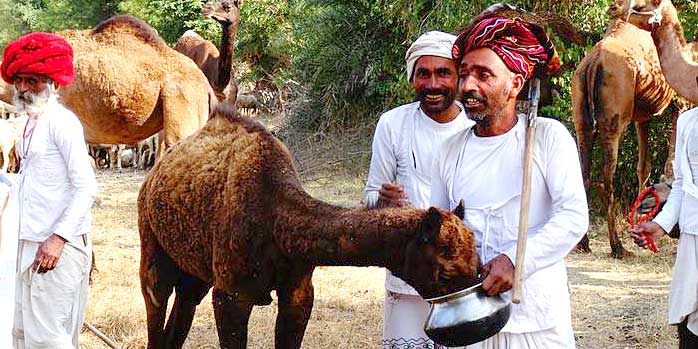DW video: Preserving Rajasthan’s camel herds
Recent DW video about the current situation of Raika pastoralists in Rajasthan and how the support of LPP is trying to create a perspective for the camel herders.
 Link:
Link:
Link: https://www.dw.com/
BBC video about India’s Pushkar Fair published in November 2018: “India’s Pushklar fair ‘fear’”
The correspondent Devina Gupta is explaining the problems that Camel herders in Rajasthan are faced with and what kind of support could help them to create their livelihood by camels also in the future.
Link: https://www.youtube.com/
Problems faced by the Bahima (nomadic pastoralist community) of Uganda
Elizabeth Katushabe works for Natural Livestock Farming (Uganda) and is an Ankole Longhorn cattle keeper herself. She belongs to the Bahima tribe in South Western Uganda used to move with their Ankole cattle. Not from last two decades Uganda government made them to settle which led to cropping of many issues from socio-economic to cultural crises to ecology threat. The community who doesn’t know farming has been facing existential crises. The long horn cattle Ankole are also facing threat. Elizabeth converses with Down To Earth on all these issues.l these issues.
Livestock Futures, Ilse Köhler-Rollefson
In this short video, Ilse introduces the work and philosophy of LPP.
Photo story: Livestock Keeping: Building a future by Susie Emmett, Green Shoots Productions
Much of the meat, milk and other products we enjoy from animals are produced by small scale livestock keepers and pastoralists. But their livelihoods are under threat. How to help?
The League for Pastoral Peoples and Endogenous Livestock Development (LPP) brought together livestock keepers and international experts in Bonn, Germany for ‘Livestock Futures’. In this photo story they share their visions for the future and how to help small scale livestock keepers and pastoralists to thrive.
Conference video (in German)
Kurzdokumentation der Livestock Futures Konferenz über die Zukunft der Nutztierhaltung
von Anne Welsing
Keepers of Genes – India’s pastoralists and their breeds
Part 1
Part 2
Part 3
Recognising Customary Rights
Pastoralists and other indigenous livestock keepers have created breeds that are a crucial asset to humanity in adapting to climate change, conserving biological diversity and sustaining food production in harsh and challenging environments.
Biocultural protocols are a means of bringing to light the crucial role of communities in conserving indigenous breeds and in maintaining the web of life that depends on them.
The film showcases Biocultural Protocols highlighting the Raika community of Rajasthan and the Samburu of Kenya.
Developing Biocultural Protocols is an important means of implementing both paragraph 8j of the CBD and Strategic Priority 6 of the Global Plan of Action on Animal Genetic Resources.
Produced by LPP, LPPS and Moving Images. With support from Misereor and Drynet (EU).
Lokhit Pashu-Palak sansthan
Lokhit Pashu Palak Sansthan means “welfare organization for livestock keepers” in Hindi. LPPS is a non-profit organization registered under the Rajasthan Societies Act. It was set up in 1996 to support Raika camel pastoralists in an acute crisis.
Biocultural Protocol
Pastoralists and other indigenous livestock keepers have created breeds that are a crucial asset for humanity in adapting to climate change, conserving biological diversity and sustaining food production in harsh and challenging environments..
Biocultural protocols are a means of bringing to light the crucial role of communities in conserving indigenous breeds and in maintaining the web of life that depends on them.
The film showcases biocultural protocls highlighting the Raika community of Rajasthan and the Samburu of kenya.
Developing Biocultural protocols is an important means of implementing both paragraph 8j of the CBD and strategic priority 6 of the Global Plan of Action on Animal Genetic Resources.
See the film here
Keepers of Genes
India’s pastoralists have created a myriad of livestock breeds that are optimally adapted to the country’s diverse landcsapes and eco-systems. These breeds are an important part of India’s biodiversity and make a major contribution to food security by producing milk, meat, manure, draught power and various other products.
But these valuable and eco-friendly production systems face many challenges and threats.
This film narrates the story of how India’s pastoralists act as “Keepers of Genes” and their struggle for survival and recognition.
See this film on Youtube: Part 1, Part 2, Part 3
